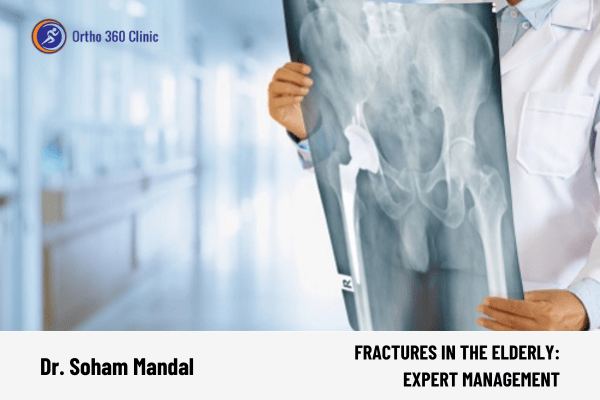Fractures are common injuries in elderly individuals due to age-related changes in bone density and increased susceptibility to falls. Managing fractures in the elderly requires special attention and care to promote optimal healing and preserve their quality of life. As the Best Orthopedic Doctor in Kolkata, I’ll discuss the unique challenges and management strategies for fractures in elderly patients.
Challenges in Elderly Fracture Management:
- Osteoporosis: Age-related bone loss can lead to osteoporosis, making bones brittle and prone to fractures. Managing underlying osteoporosis is crucial in preventing future fractures.
- Delayed Healing: Older adults may experience delayed fracture healing due to reduced blood supply to bones and slower tissue regeneration. This requires a tailored treatment approach.
- Comorbidities: Many elderly patients have underlying medical conditions, such as diabetes or heart disease, which can complicate fracture management and require coordinated care.
- Functional Decline: Fractures can result in functional decline and a loss of independence in elderly patients. Rehabilitation is essential for regaining mobility and preventing complications.
Management Strategies:
- Diagnostic Imaging: Precise diagnosis through X-rays, CT scans, or MRI helps determine the type and extent of the fracture, guiding treatment decisions.
- Fracture Reduction: Fracture reduction, which involves realigning the broken bones, is performed using minimally invasive techniques whenever possible to reduce complications.
- Surgical Intervention: In some cases, surgical intervention, such as internal fixation with plates or screws, may be necessary to stabilize the fracture.
- Pain Management: Pain control is essential for elderly patients to ensure their comfort and compliance with rehabilitation exercises.
- Rehabilitation: Physical therapy and rehabilitation play a pivotal role in restoring mobility, strength, and function after a fracture.
- Medication Management: Managing underlying conditions like osteoporosis and addressing nutritional deficiencies is vital to improve bone health.
- Fall Prevention: Implementing fall prevention strategies, such as home modifications and balance exercises, can reduce the risk of future fractures.
Conclusion
Fractures in elderly individuals demand specialized care and attention. As the Best Orthopedic Doctor in Kolkata, I emphasize the importance of a comprehensive approach that addresses not only the fracture itself but also the patient’s overall health and functional needs. Timely diagnosis, appropriate treatment, and proactive rehabilitation are key factors in helping elderly patients regain their independence and lead fulfilling lives after a fracture. If you or a loved one faces the challenge of an elderly fracture, seek expert care and guidance to ensure the best possible outcome and a return to an active lifestyle.

